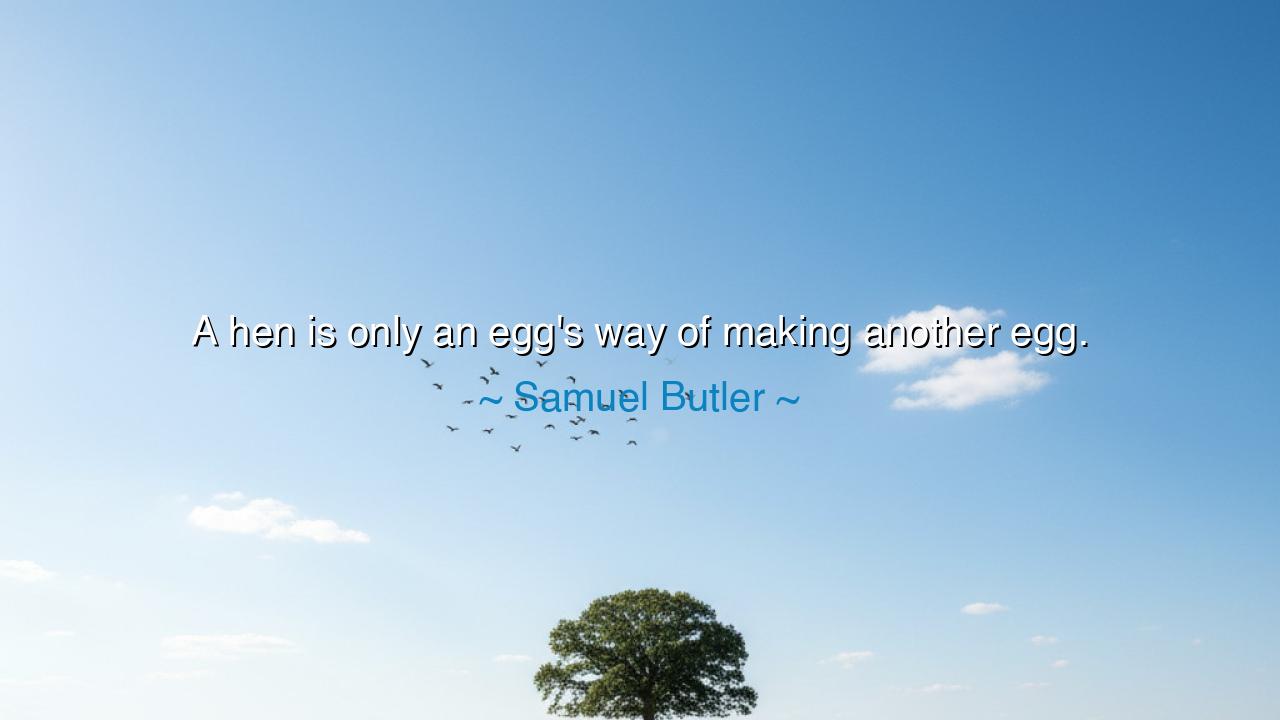
A hen is only an egg's way of making another egg.






Hear the sharp wit and paradoxical wisdom of Samuel Butler, who declared: “A hen is only an egg’s way of making another egg.” At first this saying appears as jest, a riddle wrapped in laughter. Yet within it lies a truth profound, for Butler, in his irony, was unveiling the eternal cycles of life and the hidden logic of evolution. He turns the world upside down, asking us not to see the egg as the beginning of the hen, but the hen as the servant of the egg. Thus the creature is not the master of its own destiny, but the instrument of the life that preceded it.
The meaning is this: all living beings are bound in the great chain of continuity, where no life is self-contained. The egg is potential, a spark of the future, a vessel of continuity. The hen, for all her clucking and scratching, is but the guardian of that potential, ensuring that the cycle repeats. So too in mankind: each generation may think itself the master, but in truth it exists to carry forward the life, the wisdom, and the spirit of those who came before. What we call individuality is in part the duty of continuation, of serving something greater than the self.
Consider the story of the ancient pharaohs of Egypt. They built their monuments not only for glory, but to declare themselves as links in an eternal cycle, bridging earth and eternity. Each king was but a moment, yet through him the line continued, the traditions carried forward. Like the hen to the egg, the pharaoh to the dynasty was a vessel of continuity. His task was not only to rule, but to preserve and transmit life, ensuring that the chain was not broken.
Or look to the great scientists of Darwin’s age, when Butler himself lived. The idea of evolution shook the foundations of faith and reason alike. The revelation was that life is not fixed, but ever-flowing, ever-adapting, one form giving rise to another. In this light, Butler’s jest becomes a philosophy: that existence itself is the servant of survival, that each being is but a stage in the greater unfolding of life’s story. The egg—symbol of beginning—has always been the hidden author, shaping its guardians to ensure its own endurance.
This wisdom is not to belittle life, but to awaken humility. We are not solitary monuments, but bearers of a flame that long preceded us and will long outlast us. Our task, like the hen, is not merely to live for ourselves but to nurture the seeds of tomorrow—whether in children, in ideas, in deeds, or in the communities we sustain. The irony of Butler hides a heroic call: that the greatness of life is found in serving the continuity of life itself.
O children of tomorrow, learn this lesson well: see yourself not as an end, but as a link. Ask not only, “What can I gain?” but also, “What can I pass on?” For the egg demands a hen, and the hen demands another egg, and so the cycle endures. If you would live wisely, live as a bridge between past and future, carrying forward what is best and leaving seeds of renewal behind you.
Therefore, practice daily this remembrance: honor those who gave you life, knowledge, and spirit, for you are their living vessel. And give freely to those who come after, for they are the continuation of your being. In this way, the cycle of life becomes not a burden but a blessing, not a jest alone but a song of immortality.
Thus Butler’s playful words conceal profound wisdom: “A hen is only an egg’s way of making another egg.” Laugh at the jest, but hear also the truth—that life is greater than self, and that each of us is but a vessel through which the eternal story is told.






AAdministratorAdministrator
Welcome, honored guests. Please leave a comment, we will respond soon